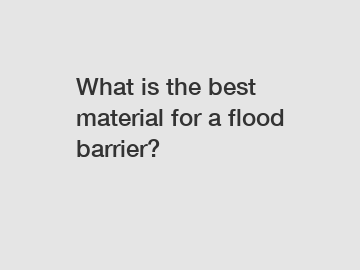What is the best material for a flood barrier?
Flooding is a natural disaster that causes widespread damage and poses a significant threat to lives and property. To mitigate the impacts of flooding, flood barriers are essential. They are designed to prevent water from entering certain areas, protecting structures and minimizing flood-related damages. One crucial aspect of constructing an effective flood barrier is choosing the most suitable material. In this article, we will explore several popular options and assess their pros and cons.
Concrete Flood Barriers:
Concrete is a widely used material for flood barriers due to its durable nature. Its strength and rigidity make it ideal for constructing robust barriers that can withstand the force of water. Concrete flood barriers offer stability and are resistant to corrosion, making them an excellent choice for long-term use and protection against major floods.

However, concrete can be challenging to install and is relatively expensive compared to other materials. Its weight also makes transportation and repositioning difficult, limiting their flexibility. Moreover, they may require additional reinforcement in high-risk areas to prevent cracking or failure under extreme water pressure.
Metal Flood Barriers:
Metal flood barriers, typically made from steel or aluminum, offer strength and versatility. They are often deployed as temporary barriers during emergencies and can be easily assembled and disassembled. Metal barriers are lightweight, which simplifies transportation and installation. Additionally, they can be adjusted to fit various openings and can be reused multiple times.
Nevertheless, metal barriers are susceptible to rust and corrosion if not properly maintained or constructed using corrosion-resistant materials. They may also dent or bend under the pressure of fast-flowing water, diminishing their effectiveness. Moreover, metal barriers may not offer as much structural stability as concrete, which could be a drawback in certain situations.
Earthen Flood Barriers:
Earthen flood barriers, or levees, have been used for centuries and are constructed using soil and vegetation. They blend in naturally with the surrounding landscape and can provide an effective defense against moderate to low floodwaters. Levees can be cost-effective compared to other materials, especially in areas where suitable soil is readily available.
However, earthen barriers require regular monitoring and maintenance to ensure their stability. The presence of vegetation in levee constructions may lead to erosion issues if not managed adequately. Additionally, earthen flood barriers may not withstand extreme flooding events, as the water pressure and hydrostatic forces exerted on them can cause breaches.
Conclusion:
When considering the best material for a flood barrier, several factors including cost, durability, ease of installation, and flexibility should be taken into account. Concrete flood barriers offer strength and longevity but can be expensive and inflexible. Metal barriers provide versatility but are susceptible to rust and may lack stability. Earthen barriers are cost-effective and blend with the environment but require regular maintenance and are not suitable for extreme flood events.
Ultimately, the choice of material depends on the specific requirements of each location and the severity of potential flooding. A combination of materials might even be the best solution in some cases. To determine the most appropriate flood barrier material for your area, it is advisable to consult with engineering professionals specializing in flood protection.
If you require further information or assistance regarding flood barriers, feel free to contact our team of experts. We are here to help you implement the most effective flood protection measures tailored to your needs.
Keywords: contact us.
If you are looking for more details, kindly visit Water Management Inflatable Rubber Dam, power generation Inflatable Rubber Dam, Melting Deicing Device.
57
0
0


Comments
All Comments (0)